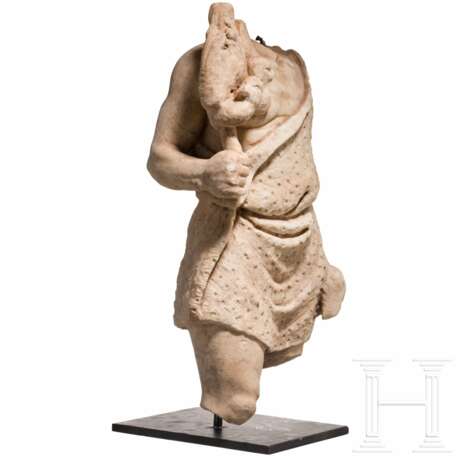ID 1198567
Lot 44 | Marmortorso eines Landwirts, 2. Jhdt. n. Chr.
Qualitätvoller Torso einer kräftigen männlichen Figur, die ein zotteliges Schaffell trägt. Das Fell ist um den Bauch herum verschnürt und nur an der linken Schulter geschlossen. Der Mann, als Jäger oder Landwirt zu deuten, hält in seiner rechten Hand in Hüfthöhe einen Spieß mit zwei Vögeln, wohl Enten. Sein linker Arm verläuft parallel zum Körper, in der Hand hält er einen Hasen an den Läufen. Die Muskulatur und die Knochenstruktur sind detailreich ausgearbeitet. Unrestauriert. Maße 46 x 22 x 14 cm, Höhe mit Stahlsockel 49 cm.
Die Skulptur gehört zur Gattung der "Fischer und Landleute", die wohl im Hellenismus entstanden ist. Dargestellt werden einfache Personen aus dem Volk, oft deutlich als ärmlich und vom Leben gezeichnet charakterisiert. Häufig sind es Fischer und Jäger, die ihre erbeuteten Tiere, typischerweise Kleinwild, tragen, manchmal sind auch dionysische Attribute dabei, sodass man annehmen möchte, die Gestalten befinden sich auf dem Weg zu einem dionysischen Fest, zu dem sie ihre Jagdbeute beisteuern.
Vgl. dazu die grundlegende Untersuchung von H. P. Laubscher, "Fischer und Landleute. Studien zur hellenistischen Genreplastik", Mainz 1982. Ein wesensgleicher Torso, der sehr wahrscheinlich aus derselben Werkstatt stammt und derselben Figurengruppe zuzuordnen ist, befindet sich in der Barnes Foundation in Philadelphia, USA, unter der Accession Number A231. Der Barnes-Torso im gleichen gepunkteten Fell hält einen Weinschlauch im Arm, wird dort allerdings als Satyr gedeutet. Gesockelt.
Provenienz: Belgische Privatsammlung U. C., erworben in den 1950er Jahren. Seitdem in diplomatischem Familienbesitz.
A marble torso of a countryman, 2nd century A.D.
A marble torso of a countryman, 2nd century A.D.
High-quality torso of a strong, male figure wearing a sheepskin. The fur is tied around the belly and is only closed at the left shoulder. The man, interpreted as a hunter or farmer, is holding a skewer with two birds, probably ducks, in his right hand at hip height. His left arm runs parallel to his body, and in his hand he holds a rabbit by its legs. The muscles and bone structure are worked in great detail. Unrestored. Dimensions 46 x 22 x 14 cm, height on steel base 49 cm.
The sculpture belongs to the genre of "fishermen and country people", a genre that probably originated in Hellenism. The statues of this group show simple people, often clearly characterized as poor and marked by life. Often it is fishermen and hunters who carry their captured animals, typically small game, and sometimes Dionysian attributes are also present, so that one would assume that the figures are on the way to a Dionysian festival to which they contribute their prey.
The basic research on this: H. P. Laubscher "Fischer und Landleute. Studien zur hellenistischen Genreplastik", Mainz 1982. An identical torso, which most likely comes from the same workshop and can be assigned to the same group of figures, is in the Barnes Foundation in Philadelphia, USA, under the accession number A231. The Barnes torso in the same spotted fur holds a wineskin in his arms, but is interpreted as a satyr. Mounted.
Provenance: Belgian private collection U. C., acquired in the 1950s. Since then in a diplomatic family estate.
Condition: II -
| Lieu d'origine: | Empire romain |
|---|
| Lieu d'origine: | Empire romain |
|---|
| Adresse de l'enchère |
Hermann Historica Bretonischer Ring 3 85630 Grasbrunn / München Allemagne | ||||||||||||||
|---|---|---|---|---|---|---|---|---|---|---|---|---|---|---|---|
| Aperçu | |||||||||||||||
| Téléphone | +49 (0)89 5472 649 0 | ||||||||||||||
| Fax | +49 (0)89 5472 64999 | ||||||||||||||
| Commission | 25 % | ||||||||||||||
| Conditions d'utilisation | Conditions d'utilisation | ||||||||||||||
| Heures d'ouverture | Heures d'ouverture
|



